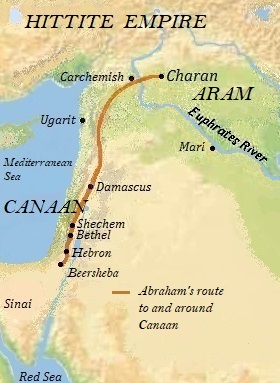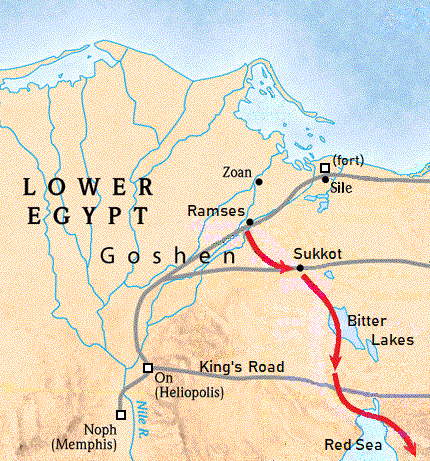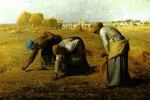After the revelation including the ten commandments at Mount Sinai, God gives the people a series of more specific laws in this week’s Torah portion, Mishpatim (“Laws”). One of these laws becomes a theme in the Hebrew Bible:

You may not oppress a geir, nor may you push him around1, for you yourselves were geirim in the land of Egypt. (Exodus/Shemot 22:20)
geir (גֵּר) = immigrant, resident alien; (or) a foreign man who has settled down in ancient Israel, has been circumcised, and observes the state religion. (Plural geirim (גֵּרִים). From the root verb gur, גוּר.)
As far as we know, no other country in the Ancient Near East had a law against oppressing immigrants. From Exodus to Jeremiah, the Hebrew Bible tells us 18 times to love the geir, to apply the same rules to the geir as to the native citizen, and not to oppress, push, or exploit a geir.2 Four times the bible adds that we were geirim in Egypt.
And the Israelites trace their own ancestry to a geir couple who immigrated to Canaan.
Aramean immigrants in Canaan

And God said to Abraham: “Go for yourself, away from your land and from your birthplace and from your father’s house, to the land that I will show you.” (Genesis/Bereishit 12:10)
Abraham, his wife Sarah, his nephew Lot, and all the people who work for them leave the land of Aram forever and immigrate to Canaan, where they become neighbors, allies, and trading partners with the natives.
Just as most Americans who were born in the United States are descended from immigrants, the “native citizens” of the two Israelite kingdoms traced their descent to Jacob, the grandson of the immigrants Abraham and Sarah.
Israelite immigrants in Egypt
Jacob, a.k.a. Israel, immigrates to Egypt with his entire family.

According to the Torah the Israelites (“the Children of Israel”) live there for 430 years3—but the Egyptians still view them as foreigners. Two pharaohs worry that if the Israelites become too populous they might rebel and fight against Egypt.4
They finally do rebel, but without fighting. The Israelites and some fellow-travelers walk away from slavery and out of Egypt, following Moses and God’s pillar of cloud and fire.
God’s plan is to “give” the Israelites the land of Canaan, where their ancestors Abraham, Isaac, and Jacob were once resident aliens.
Immigrants in the two Israelite kingdoms
Later in this week’s Torah portion, God elaborates:
You may not push around a geir; and you know the nefesh of a geir, since you were geirim in the land of Egypt. (Exodus 23:9)
nefesh (נֶפֶשׁ) = soul that animates the body, state of mind, inclination, appetite.
Does knowing the state of mind of an immigrant help people to treat new immigrants fairly?
Twentieth-century scholar Nehama Leibowitz has pointed out that many people who were oppressed in the past become tyrants themselves if they come into positions of power.5 This, she wrote, is why Ramban (13th-century rabbi Moses ben Nachman, or Nachmanides) interpreted the phrase “you were geirim in the land of Egypt” as a reminder that the Egyptian oppressors thought there was no one to help the Israelites, but God responded to their cries—and destroyed much of Egypt in the process.6 The implied warning is: When you have your own land, don’t imagine that the strangers living among you will be helpless. God will respond to the cries of any immigrants you oppress, and then you’ll be sorry.
The bible distinguishes between a visiting foreigner, who is not expected to observe Israelite religious law, and a geir, a resident alien who has no other home. A geir must follow the same rules as a native about holy days,7 burnt offerings to the God of Israel,8 blasphemy9, child sacrifice,10 and procedures regarding dead animals11.
Natives and geirim get equal rights as well as equal responsibilities. Judges are forbidden to wrong a geir12, and the cities of refuge are available to a geir as well as a native who commits accidental manslaughter.13
Furthermore, employers must let the geirim who work for them take a day off every week, just like the Israelites.14 One law in the portion Mishpatim states:
Six days you shall do your jobs, but on the seventh day you shall cease, so that your ox and your donkey shall rest, and the son of your slave-woman and the geir yinafeish. (Exodus 23:12)
yinafeish (יִנָּפֵשׁ) = he shall refresh his nefesh, recover himself, reanimate himself. (See my post Shabbat in Yitro, Mishpatim, and Ki Tissa: Soul Recovery.)
The bible considers geirim a disadvantaged group, like widows, fatherless children, and the very poor, so there are many reminders that the rest of society must help them. Every year, land owners must leave behind gleanings for the poor, widows, orphans, and geirim.15 Every third year, they must give a tithe to feed several groups of people who do not own land, including geirim.16
Why were geirim at a disadvantage? Modern scholars have noted that resident aliens were especially vulnerable to being cheated and taken advantage of, because unlike ordinary Israelites, they had no clan network to protect them, and unlike visiting foreigners, they could not call on the countries where they were born for succor.17 Furthermore, they had no hereditary land in either of the two kingdoms of Israel. They could buy land, but every fiftieth year the land reverted to the Israelite clan that originally owned it.18
Citizenship for one wave of geirim
All the biblical laws about not oppressing geirim and making sure they have enough to eat apply to geirim who arrive after the Israelites have established their own country in the land formerly called Canaan.
But three times in the bible, when Israelites are preparing to seize the land of Canaan, the geirim who chose to travel with the Israelites are included as regular citizens of the new kingdom-to-be.
In Deuteronomy, Moses declares that all the geirim who traveled with the Israelites from Egypt will be included in the covenant with God.19 Joshua then seizes much of Canaan through war, killing or subjugating the native population (as Europeans did to the native populations in America in order to seize their land). But when Joshua holds a covenantal ceremony for the new owners of the land, he asks the children of the geirim who traveled with the Israelites from Egypt to join the Israelites in the ritual blessing at Mount Gerizim and Mount Eval.20
During the Babylonian Exile in the 6th century B.C.E., the prophet Ezekiel tells the Israelites that when they finally return to their old land, they will be allotted land-holdings along with the geirim among them. And they will be for you as native-born citizens, along with the Children of Israel … (Ezekiel 47:22)
In short, the bible dictates that people from other ethnic groups who joined the Israelites in Egypt or Babylon will become citizens just like the descendants of Jacob. People who immigrate separately to the land of Israel must receive the same rights and responsibilities as native-born citizens. God decrees that these geirim must not be cheated or oppressed. They have to be treated with justice and kindness, and if they are poor they must be fed the same way as the poor among the Israelites.
These laws about treating immigrants as equals were so important that they were repeated again and again in the Hebrew Bible.
If the relatively primitive culture of ancient Israel held this standard, I wonder why the United States of America cannot do the same today?
- The verb lachatz (לָחַץ) can mean press toward, crowd, oppress, push toward, or push around.
- Exodus 22:20, 23:9; Leviticus 19:33-34; and Ezekiel 22:7, 22:29 prohibit oppressing the geir. Leviticus 19:33-34 and Deuteronomy 10:18-19, 24:14 command the Israelites to love the geir or treat him like a brother. Exodus 12:19, 12:48-49, 23:12; Leviticus 24:22; Numbers 9:14, 15:14-16, 35:15; Deuteronomy 1:16, 5:14, 16:14, 24:14, 26:11-13; and Joshua 20:9 mandate the same laws and rules for native citizens and geirim.
- Exodus 12:40.
- Both the first and the second pharaoh in the Exodus story enslave the Israelites by assigning them to corvee labor making bricks, building cities, and doing fieldwork (Exodus 1:8-14, 5:4-9), on the theory that if they have no free time, they cannot rebel. The first pharaoh also tries to reduce the Israelite population through infanticide (Exodus 1:15-22).
- We are told not to oppress (inah, עִנָּה) or push around (lachatz, לָחַץ) or subvert the rights of (hitah mishpat, הִטָּה מִשְׁפַּט) or exploit (ashak, עָשָׁק) a geir in Exodus 20:20 and 23:9; Leviticus 19:33-34; Deuteronomy 1:16, 24:14, 24:17-18, and 27:19; Jeremiah 7:6 and 22:3; Ezekiel 22:7 and 22:29; Zecharaiah 7:10, and Malachi 3:5. A reference to the Israelites being geirim in Egypt is included in Exodus 20:20 and 23:9, Leviticus 19:33-34, and Deuteronomy 24:17-18. God tells native citizens to love the geir in Leviticus 19:33-34 and Deuteronomy 10:19.
- Nehama Leibowitz, Studies in Shemot, Part II, translated by Aryeh Newman, Joint Authority of Jewish Zionist Education, Jerusalem, 1996, p. 384-6.
- 13th century rabbi Moshe ben Nachman, or Nachmanides.
- Exodus 12:19 and 12:48-49; Leviticus 16:29; Numbers 9:14; and Deuteronomy 16:11-12 and 16:14.
- When geirim make burnt offerings to the God of Israel, they must follow the same rules as natives in Leviticus 17:8 and 22:18, Numbers 15:14-16 (which adds “you are alike before God”), and Numbers 19:10. Geirim are also included in the community that God forgives when it unknowingly makes an error in observance (Numbers 15:16 and 15:29).
- Leviticus 24:16 (using God’s name in blasphemy) and Numbers 15:30 (reviling God).
- Geirim, like native citizens, are forbidden to offer their children to Molech (Leviticus 18:26 and 20:2).
- Geirim as well as natives are forbidden to eat the blood of slaughtered animals (Leviticus 17:10-13) or animal carcasses killed by predators (Leviticus 17:15). Leviticus 24:21-22 says the law about making restitution if you kill someone else’s livestock also applies to geirim.
- For example, see Exodus 12:49, Leviticus 24:22, Numbers 14-16, Deuteronomy 1:16, and Jeremiah 22:3.
- Numbers 35:15 and Joshua 20:9.
- Shabbat for geirim is mandated in Exodus 20:10 (one of the Ten Commandments), Exodus 23:12 (translated above), and Numbers 5:14.
- Leviticus 19:10 and 23:22.
- Deuteronomy 14:29 and 26:11-13.
- James L. Kugel, The God of Old, The Free Press, New York, p. 109; and W. Gunther Plaut, The Torah: A Modern Commentary, Union of American Hebrew Congregations, New York, 1981, p. 582.
- See my post Behar: Owning Land.
- Deuteronomy 29:10.
- Joshua 8:33-35.

Beautiful message and clearly and powerfully stated. Thank you Melissa.
Thank you, Patrice.
Some parts of the Torah reflect ancient cultural standards that we need to reject.
Other parts of the Torah deliver the moral messages we still need to hear.
Thank you Melissa. A timely teaching for the crazy times in our country. In ancient times the Israelites aspired to live up to the standards that God set into law. While they didn’t always get it right, they kept returning to God. Sad to say that the United States is a country that has lost its direction and its ideals of the founding fathers. When the leaders of this country are idolators they have lost their ability to live from a place of holy connection and embody the values that come from that place.
On a lighter note, I love seeing the Millet painting. He did such beautiful art!
Shabbat Shalom
May we as Jews and Geirim continue to embrace the ancient values of social justice and help guide our country back to part of what makes it a great nation.
Amen.